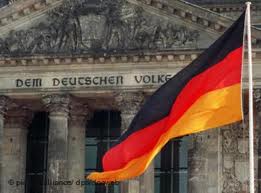GERMANY-KOSOVO, RELATIONS
 German Chancellor Angela Merkel said Friday clashes between NATO soldiers and Serbs on the border with Kosovo showed Serbia was not yet ready to be a candidate for European Union membership. Germany sent 600 Soldiers to serve as Peacekeepers in EULEX; an EU Police, Civilian and Law Mission in Kosovo.
German Chancellor Angela Merkel said Friday clashes between NATO soldiers and Serbs on the border with Kosovo showed Serbia was not yet ready to be a candidate for European Union membership. Germany sent 600 Soldiers to serve as Peacekeepers in EULEX; an EU Police, Civilian and Law Mission in Kosovo.
“The path of Serbia into the EU can only lead through the normalisation of its relations with Kosovo,” Merkel told the German parliament.
“I regret that Serbia has so far not lived up to these expectations sufficiently and therefore the conditions for being awarded the status of a candidate are not yet in place.”
Thirty German and Austria soldiers were injured Monday, some by small-arms fire and Molotov cocktails, when hundreds of Serbs resisted an attempt by NATO peacekeepers to remove roadblocks erected by Serbs in the largely lawless north of Kosovo.
Serbs in the north reject the 2008 declaration of independence by Kosovo’s ethnic Albanian majority and have been manning barricades since the government tried to send border police to the mainly Serb north in July.
Western diplomats have warned the turmoil in Kosovo could cost Serbia official candidate status for membership of the EU when the bloc’s leaders next meet on December 9.
Merkel said it was “unacceptable” for Serbia to contribute to the tense atmosphere surrounding the attack on the international Kosovo Force (KFOR) soldiers.
The reaction in Serbia to Merkel’s comments was one of disappointment, but the government said it would persevere with its efforts to join the EU.
“This is a very serious message, we, however, need to study it and prepare future moves,” a government official who spoke on condition of anonymity told Reuters.
“Regardless of this, Serbia will persist on its path to the EU, including efforts to find a sustainable solution for the final status of Kosovo.”
Serbian President Boris Tadic will be in Germany this weekend to attend the SPD party congress in Berlin.
Serbia lost control over Kosovo in 1999, when NATO bombed for 78 days to halt the killing and expulsion of ethnic Albanians in a two-year counter-insurgency war under then-President Slobodan Milosevic.
More than 80 countries, including the United States and 22 of the EU’s 27 members, have recognized the state, the last to emerge from the remains of old federal Yugoslavia.
German–Kosovan relations are foreign relations between Germany and the Republic of Kosovo[a]. Kosovo declared its independence from Serbia on 17 February 2008 and Germany recognised it on 20 February 2008.[1] Germany has an embassy in Pristina since 27 February 2008.[2] Kosovo has an embassy in Berlin[3] and consulates in Frankfurt and Stuttgart.
Germany is the second-largest donor to Kosovo behind the US.
BND affair
On 19 November 2008 three agents of the Bundesnachrichtendienst were arrested in Kosovo and accused of involvement in a bomb attack five days earlier.[6] The German media speculated that this arrest was meant as some kind of punishment for the BND, which in 2005 certified that Prime Minister Hashim Thaçi was involved in the Kosovar-Albanian mafia network.[7] Even though the Kosovo police claimed to have video evidence proving the involvement of the three agents (which was never shown to the public)[8], they were released on November 28 2008[9]. An unknown group called Army of the Republic of Kosovo (ARK) claimed responsibility for the bomb attack.
Military
Germany participated in the 1999 NATO bombing of Yugoslavia, which resulted in a UN administration of Kosovo and then to eventual independence. Germany currently has 2,350 troops serving in Kosovo as peacekeepers in the NATO led Kosovo Force. Originally there was 8,500 German troops in KFOR. Klaus Reinhardt was the 2nd KFOR Commander from 8 October, 1999 – 18 April, 2000. Holger Kammerhoff was the 8th KFOR Commander from 3 October, 2003 – 1 September, 2004. Also Roland Kather was the 11th KFOR Commander from 1 September, 2006 – 31 August, 2007.
Kosovo is the subject of a territorial dispute between the Republic of Serbia and the self-proclaimed Republic of Kosovo. The latter declared independence on 17 February 2008, while Serbia claims it as part of its own sovereign territory. Its independence is recognised by 85 UN member states.














